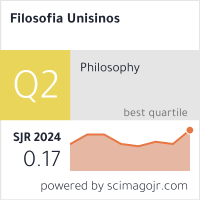The obscurity of the physical: an objection to Chalmers’ conceivability argument
DOI:
https://doi.org/10.4013/fsu.2020.213.07Resumen
A zombie world is a possible world in which all the microphysical truths are identical to the truths in our world, but no one is phenomenally conscious. A zombie is an individual in a possible world whose microphysical truths are identical to the microphysical truths of an individual in our world, but who has none of the phenomenal conscious experiences of the individual in our world. An inverted is an individual in a possible world whose microphysical truths are not only identical to the microphysical truths of an individual in our world, but who also has phenomenal conscious experiences. These experiences, however, are qualitatively different from the ones of the individual in our world. The first premise of Chalmers’ conceivability argument against materialism is that a zombie world, a zombie and an inverted are ideally conceivable. This paper rejects this premise in claiming that: given that current physics does not allow philosophers to establish a clear concept of the physical that could be opposed to something else non-physical, a zombie world, a zombie and an inverted are merely prima facie, but not ideally conceivable. This objection is called the Obscurity of the Physical Objection.
Key-words: Zombies, qualia, conceivability, possibility, physics.
Descargas
Descargas
Publicado
Cómo citar
Número
Sección
Licencia
Concedo a revista Filosofia Unisinos – Unisinos Journal of Philosophy o direito de primeira publicação da versão revisada do meu artigo, licenciado sob a Licença Creative Commons Attribution 4.0 (que permite o compartilhamento do trabalho com reconhecimento da autoria e publicação inicial nesta revista).
Afirmo ainda que meu artigo não está sendo submetido a outra publicação e não foi publicado na íntegra em outro periódico e assumo total responsabilidade por sua originalidade, podendo incidir sobre mim eventuais encargos decorrentes de reivindicação, por parte de terceiros, em relação à autoria do mesmo.










